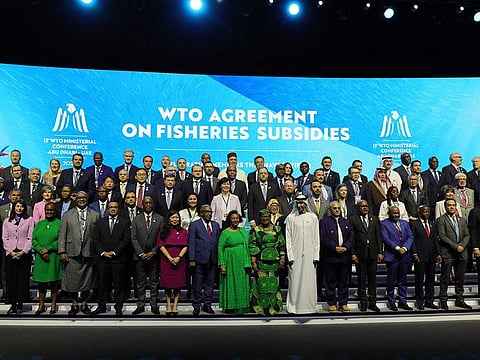Abu Dhabi: WTO aims for progress in fisheries, agriculture, ecommerce amid headwinds
Trade remains critical in delivering national priorities, says WTO DG Ngozi Okonjo-Iweala

Abu Dhabi: The World Trade Organisation (WTO) is hopeful for fisheries, agriculture, and e-commerce breakthroughs amid economic and political headwinds at its 13th Ministerial Conference (MC13). The world’s trade ministers have gathered in Abu Dhabi, starting Monday (February 26), for the high-level WTO meeting, where ministers aim to forge agreements on key fishing and agriculture industries to address sustainability and food security.
Early Monday, WTO members welcomed more formal acceptances of the Fisheries Subsidies Agreement at the opening ceremony. “With the 70 we’ll have this week, we’ll now have 40 members to go, so the countdown towards entry into force can start in earnest,” said Ngozi Okonjo-Iweala, Director-General of the World Trade Organisation.
The WTO struck a fisheries agreement 2022 that banned subsidies contributing to illegal, undeclared and unregulated fishing. The organisation now hopes to conclude a second deal, focusing on subsidies that drive overcapacity and overfishing.
On a lighter note, the Director-General urged the remaining member nations to ratify the fisheries agreement before her birthday in June, which will also mark two years since MC12. “When we succeed, it will be the fastest entry into force of any WTO agreement, and I know we will succeed,” she said.
At WTO’s 12th Ministerial Conference, ministers adopted a set of decisions and declarations on several trade issues, known as the “Geneva Package”, with essential outcomes on agriculture and fisheries.
“Members sent a powerful signal that the WTO can respond to contemporary challenges. In a world marked by strategic competition, we could also have strategic cooperation in pursuit of shared goals,” she stated.
Sheikh Khaled bin Mohamed bin Zayed Al Nahyan, Crown Prince of Abu Dhabi, and Chairman of Abu Dhabi Executive Council, attended the opening ceremony.
Global headwinds
That said, to close significant deals, WTO’s rules require complete consensus among all 166 -member states, which experts say is a tall order in the current climate.
The Director-General said, “Uncertainty and instability are everywhere. Geopolitical tensions have worsened, and conflict has spread. As we see here in the Middle East and parts of Africa… we must not forget the condition of those in Sudan and those in the East of the Democratic Republic of Congo, where higher prices for food, energy, fertiliser and other essentials continue to weigh on people’s purchasing power, fueling political frustration.”
Moreover, shipping disruptions in vital waterways, like the Red Sea and Panama Canal, are new sources of delays and inflationary pressure. “People everywhere are feeling anxious about the future,” she added. Moreover, countries like the US and India are also going to polls this year. She said, “While some countries are performing well economically, the same cannot be said for others. In many countries, debt distress and high financing costs drag economic prospects.”
What is WTO’s Fisheries Subsidies Agreement?
The WTO Agreement on Fisheries Subsidies is the first WTO agreement that focuses on environmental sustainability. It establishes a set of binding prohibitions and rules that seek to ensure that the support governments provide to their fishing sector does not undermine the sustainability of marine resources.
Trade is resilient
Despite everything, trade has been resilient in recent years, according to the Director-General. Global goods and services trade remain at or near record highs, and international markets have stayed open – helping households and economies adapt to one shock after the other. “But it would be dangerously naïve to take trade’s continued resilience for granted. The global economic slowdown and wider Uncertainty are already having an impact,”
She added that global merchandise trade volume growth in 2023 fell short of the 0.8 per cent we projected last year.
“Trade remains critical on delivering national priorities- like meeting SDGS, preparing for the next pandemic, and measuring growth,” she stated.
However, she warned that cooperation on trade is necessary for the world to move to an increasingly fragmented world economy. “As a result, some of these priorities would become harder and, in some cases, costlier to achieve. People would become more disappointed and frustrated,” she said.
Meanwhile, Dr Thani bin Ahmed Al Zeyoudi, Minister of State for Foreign Trade and Chair of the 13th WTO Ministerial Conference 2024, said the event could be the ‘launch pad’ for the future of global trade and reform and address challenges.
He said, “I ask all of you to show the world that the WTO is alive and well and capable of delivering results that matter to people everywhere. We also need to show through the outcomes of this conference that trade and the multilateral system can and will contribute to development. We have the unique opportunity to shape the future of trade collectively,” he said.
New members
On Monday, the 29-year-old trade watchdog also welcomed the accession of two new member countries – Timor-Leste and Comoros. Both countries are the least developing countries (LDCs), and we are excited to see them reap the benefits of WTO membership. About 22 more countries are seeking to follow in their footsteps, and many are here as observers, including a sizeable contingent from the Arab world,” said the Director-General. WTO has 166 member countries.
Sign up for the Daily Briefing
Get the latest news and updates straight to your inbox







